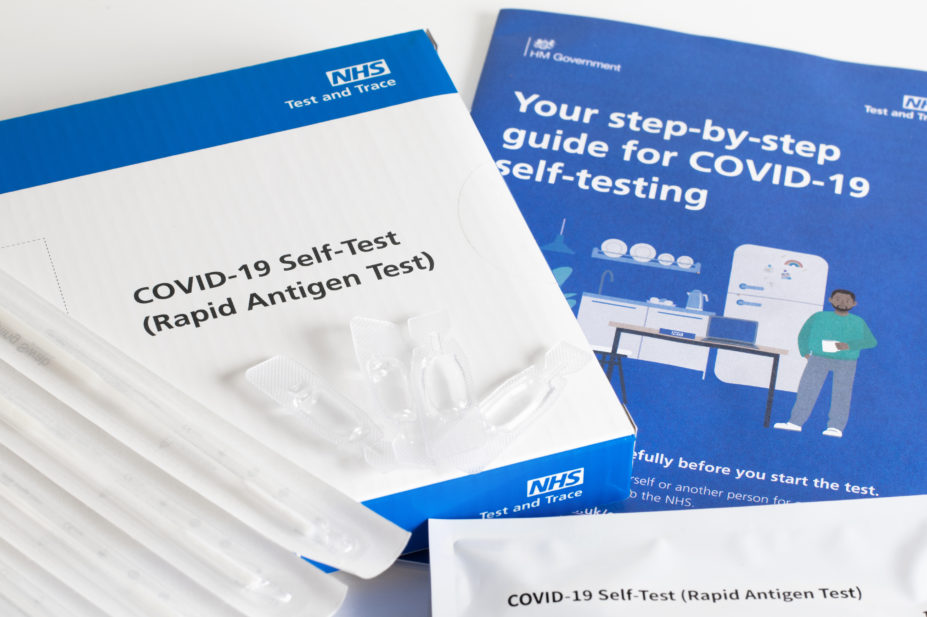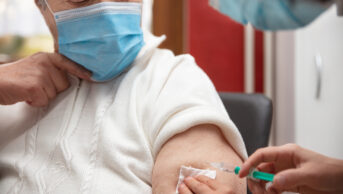
Shutterstock.com
The UK government says it will cap the number of lateral flow test (LFT) kits it distributes in England to manage demand ahead of closing access to free COVID-19 testing.
In a report published on 21 February 2022 — ‘Living with COVID-19’ — the government announced that it would end “free universal symptomatic and asymptomatic testing for the general public” from 1 April 2022, while maintaining access to free “limited symptomatic testing” for at-risk groups.
The document explained that the government’s free offer “of testing at scale has come at a very significant cost to the taxpayer during the pandemic response”, with more than 2 billion lateral flow tests provided across the UK since 2020.
“The UK Health Security Agency (UKHSA) [which oversees the distribution of LFT kits in the UK] continues to have good stock levels and will manage these to provide flexibility in future,” the document said.
However, it added: “Ahead of the end of free universal testing in England, it will be necessary for the UKHSA to cap the number of tests distributed each day to manage demand.
“Given that advice to test has and continues to reduce, the government urges people only to order what they need.”
The UKHSA did not confirm to The Pharmaceutical Journal in time for publication whether the cap applied to home deliveries or to orders placed by community pharmacies.
The government report also notes that people will be able to purchase LFT kits after 1 April 2022, as the government plans to work with “pharmacies to help establish the private market in testing”.
Boots, the UK’s largest multiple pharmacy, announced in a statement on 22 February 2022 that it planned to sell individual LFTs for £5.99 and packs of four for £17 from the following day on its website.
The statement added that, from March 2022, it plans to sell LFTs at over 400 Boots stores, priced at £2.50 for one test or £12 for a pack of five.
However, some pharmacy representative bodies have warned that the new guidance could put pharmacy staff at risk.
A spokesperson for the Company Chemists Association said: “Unfortunately, during the pandemic, we have witnessed a rise in incidents of abusive behaviour from members of the public.
“The government needs to set out its zero tolerance approach to any abuse, as we saw over Christmas when lateral flow tests were in short supply.
“We also need urgent guidance to allow pharmacies to facilitate a smooth withdrawal of lateral flow tests for the non-clinically vulnerable members of the public, ensuring that everybody who wants to can buy a test from 1 April [2022].”
Thorrun Govind, chair of the Royal Pharmaceutical Society’s English Pharmacy Board, told BBC News on 21 February 2022 that there are “some key questions which will need to be answered”.
“Pharmacists have always put patient care first, but all too often we’ve seen guidance on implementation struggle to keep up with last minute political decisions.
“Whatever happens in the coming days, we don’t want to see pharmacy teams left to pick up the pieces,” she said.
Community pharmacies saw a surge in demand for LFT kits in December 2021, following the government announcement that fully vaccinated contacts of people with a positive COVID-19 test were required to take a LFT each day for seven days, in lieu of self-isolating.
In response, the government distributed an additional 2.5 million LFT kits to community pharmacies each week in January 2022.
As of November 2021, community pharmacies had fulfilled nearly 17 million requests from patients for LFT kits through the ‘Community pharmacy COVID-19 lateral flow device distribution service’.
Commenting on the government’s plans, Alastair Buxton, director of NHS services at the Pharmaceutical Services Negotiating Committee, said the negotiating body had been in discussions with the government about the future of the LFT distribution service “for several weeks”.
“We can now continue discussions on the service and will let contractors know as soon as there is further news to share,” he said.
Alliance Healthcare — the sole wholesaler of LFT kits to community pharmacies — declined to comment on the government’s plans.
Read more: How reliable are lateral flow COVID-19 tests?
- This story was amended on 22 February 2022, following the publication of Boots’ statement


